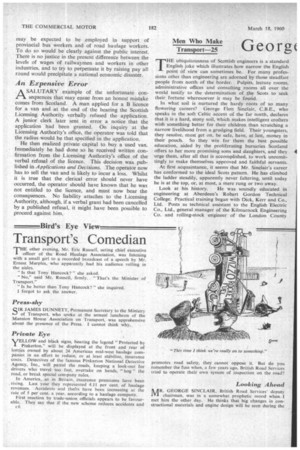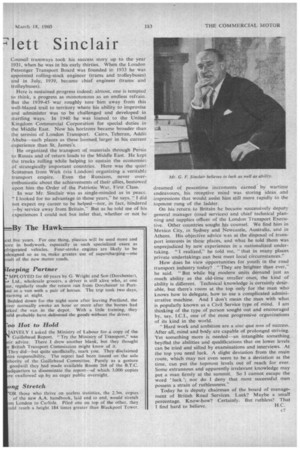Men Who Make Transport-25 Geo rg(
Page 42

Page 43

If you've noticed an error in this article please click here to report it so we can fix it.
=lett Sinclair
THE ubiquitousness of Scottish engineers is a standard English joke which illustrates how narrow the English point of view can sometimes be. For many professions other than engineering are adorned by those steadfast people from north of the border. Pulpits, lecture rooms, administrative offices and consulting rooms all over the world testify to the determination of the Scots to seek their, fortune wheresoever it may be found.
In what soil is nurtured the hardy roots of so many flowering careers? George Flett Sinclair, C.B.E., who speaks in the soft Celtic accent of the far north, declares that it is a hard, stony soil, which makes intelligent crofters wish something better for their children than scratching a narrow livelihood from a grudging field. Their youngsters, they resolve, must get on, be safe, have, at last, money in their pouch. So they win for them the best possible education, aided by the proliferating bursaries Scotland offers to her more promising sons and daughters, and they urge them, after all that is accomplished, to work unremittingly to make themselves approved and faithful servants.
At first acquaintance, it seems that Mr. Sinclair's career has conformed to the ideal Scots pattern. He has climbed the ladder steadily, apparently never faltering, until today he is at the top, or, at most, a mere rung or two away.
Look at his history. He was soundly educated in engineering at Aberdeen's Robert Gordon Technical College. Practical training began with Dick. Kerr and Co., Ltd. Posts as technical assistant to the English Electric Co., Ltd., general manager of the Kilmarnock Engineering Co. and rolling-stock engineer of the London County Council tramways took his success story up to the year 1931, when he was in his early thirties. When the London Passenger Transport Board was founded in 1933 he was appointed rolling-stock engineer (trams and trolleybuses) and in July, 1939, became chief engineer (trams and trolleybuses).
Here is sustained progress indeed: almost, one is tempted to think, a progress as monotonous as an endless refrain. But the 1939-45 war roughly tore him away from this well-blazed trail to territory where his ability to improvise and administer was to be challenged and developed in startling ways. In 1940 he was loaned to the United Kingdom Commercial Corporation for special duties in the Middle East. Now his horizons became broader than the termini of London Transport. Cairo, Teheran, Addis Ababa such places as these loomed larger in his current experience than St. James's.
He organized the transport of materials through Persia to Russia and of return loads to the Middle East. He kept the trucks rolling while helping to sustain the economies of strategically important countries. Here was the quiet Scotsman from Wick (via London) organizing a veritable transport empire. Even the Russians, never overenthusiastic about the achievements of their allies, bestowed upon him the Order of the Patriotic War, First Class.
In war Mr. Sinclair was as single-minded as in peace. "I looked for no advantage in those years," he says. "I did not expect my career to be helped—nor, in fact, hindered —by service away from Britain." But as he told me of his experiences I could not but infer that, whether or not he dreamed of peacetime increments earned by wartime endeavours, his receptive mind was storing ideas and impressions that would assist him still more rapidly to the topmost rung of the ladder.
On his return-to Britain he became successively deputy general manager (road services) and chief technical planning and supplies officer of the London Transport Executive, Other countries sought his counsel. We find him in Mexico City, in Sydney and Newcastle, Australia, and in Athens. His objective advice was at the disposal of transport interests in these places, and what he told them was unprejudiced by new experiences in a nationalized undertaking. " I realized,he told me, "that in many places private undertakings can best meet local circumstances."
How does he view opportunities for youth in the road transport industry -today? "They are brighter than ever," he said. "But while big modern units demand just as much ability as the old-time smaller ones, the kind of ability is different. Technical knowledge is certainly desirable, but there's room at the top only for the man who knows how to delegate, how to use a complicated administrative machine. And I don't mean the man with what is popularly known as a Civil Service type of mind. I am thinking of the type of person sought out and encouraged by, say, I.C.I., one of the most progressive organizations of its kind in the world.
"Hard work and ambition are a sine qua non of success. After all, mind and body are capable of prolonged striving. Yet something more is needed—an intangible something beycind the abilities and qualifications that on lower levels can be tried and sifted by examinations and interviews. At the top you need luck, A slight deviation from the main route, which may not even seem to be a deviation at the time, can put the topmost levels out of reach for ever. Some extraneous and apparently irrelevant knowledge may put a man firmly at the summit. So I cannot escape the word 'luck '; nor do I deny that most successful men possess a strain of ruthlessness."
Today he is deputy chairman of the board of management of British Road Services. Luck? Maybe a small percentage. Know-how? Certainly. But ruthless? That I find hard to believe. H.C.
























































































































